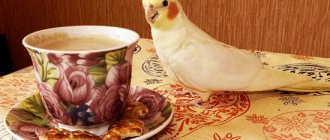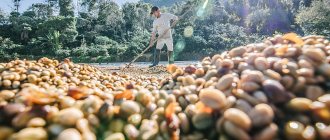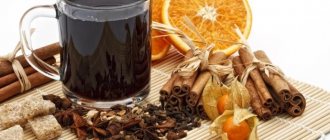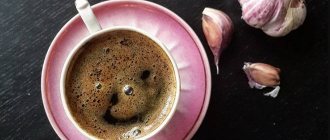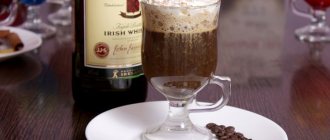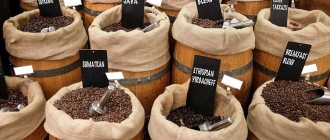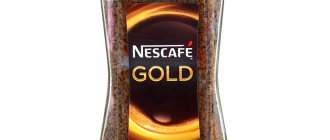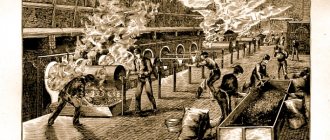Classic coffee recipe with cloves
According to the traditional recipe, you need to use a Turk to brew this aromatic drink. Ingredients:
- coffee beans;
- low-fat milk;
- sugar;
- mineral water;
- fresh cloves.
Before you start cooking, you need to grind the main raw material - grains. To do this you need to use a coffee grinder. The fruits turn to dust. It is important that they are fresh.
Now pour the granular powder into the Turk and fill it with mineral water. Stir the mixture and place it on low heat. You can remove the container from the stove after a thick, rising foam has formed. As soon as it settles, return the Turk to the stove.
Sweeten, but do not add too much granulated sugar, as this will ruin the taste of the coffee. Pour the drink into thick-walled cups. Add cloves and milk to each of them.
The coffee needs to brew. This is required for the spice to share its taste and aroma.
How to brew acorns
Traditional recipe
Acorn powder should be prepared in the same way as ground coffee. Prepare:
- A teaspoon of chopped acorns;
- One hundred and fifty milliliters of water;
- One spoon of sugar.
Pour sugar and acorns into the Turk, then pour in water. Place on low heat and cook until foam rises. Pour the drink into a cup, you can add cinnamon or cream.
Acorn jelly
To prepare healthy jelly, you will need the following ingredients:
- Seven grams of acorn powder;
- Glass of water;
- Ten grams of potato starch;
- Two spoons of sugar.
Dissolve coffee powder and sugar in a small amount of boiling water. Add the remaining water, mix well and strain the drink. In a separate bowl, dilute the starch with a tablespoon of water. Place the strained coffee on the fire; when it boils, pour in the starch in a thin stream and remove the container from the stove. Pour the finished drink into a cup.
Acorn drink
For this recipe, prepare the following ingredients:
- Thirty grams of dry crushed acorn powder;
- Two tablespoons each of wheat, oats, rye and dandelion root;
- Twenty grams each of wild chicory and barley.
Grind all ingredients to a powder, mix and store in a glass container that can be closed. To brew a medicinal infusion, pour one teaspoon of powder into a glass of boiling water and leave for five minutes. You can add milk, honey or sugar to the finished drink to taste.
Coffee with salt
To give the drink an original taste and more benefits, we recommend brewing it with spices. Mostly cloves, salt, pepper or cinnamon are added. To make coffee you will need a dry preparation of acorns, a glass of water and a pinch of salt. Pour the ingredients into a pot, add water and cook until the foam rises.
If you were unable to prepare acorns, you can buy them
When choosing, pay attention to the packaging and consider the time of year. If you buy a product before the beginning of autumn, it means that these are last year’s or unripe fruits
Acorn drink is natural and incredibly healthy. The brewed infusion resembles our usual invigorating coffee with a nutty aroma. It depends on the degree of roasting of the acorns; the taste may resemble cocoa or coffee. Its preparation requires a minimum of time and expense.
Coffee with cloves and cinnamon
It’s easy to prepare this drink at home. For this you will need:
- spices – cinnamon and cloves;
- ground Arabica grains;
- granulated sugar;
- mineral water.
Take the Turk. Fill it with coffee, granulated sugar and spices. You can use other sweeteners if desired. Then pour in mineral water. Stir the mixture well.
Place the Turk on the stove and bring its contents to a boil. As soon as the foam rises to the top, remove the container from the heat. Then put it there again. Do this manipulation three times.
Pour the coffee into a glass container and enjoy it. For greater pleasure, we recommend drinking an infused drink.
With cinnamon and pepper
Spices and herbs are a great addition to an invigorating drink. To make it invigorating, tasty and aromatic at the same time, you need to cook it with pepper.
Components:
- ground coffee;
- black peppercorns;
- spices to taste;
- granulated sugar;
- water.
Fill the Turk with all the ingredients. Coffee, cloves and cinnamon go well together, so it is recommended to use them.
All components are placed in a Turk over low heat. As soon as a lush, rising foam begins to form in the container, remove it from the heat. During brewing you will feel a pleasant coffee aroma.
The last stage is pouring the finished drink into cups. It is advisable to infuse it for 10 minutes before use. This coffee perfectly warms, tones, and gives strength.
Scientists have proven that regular consumption of coffee (in small quantities) helps improve brain performance. Therefore, to improve intellectual function, drink up to 50 ml of this drink daily.
To stimulate potency, experts recommend adding ginger to the drink. It has been proven that this ingredient has a beneficial effect not only on sexual function, but also stimulates sexual desire.
Treatment at home
Cloves are very popular in folk medicine and are used in the treatment of various diseases. For effective therapy, you need to use dried buds, and not already purchased ground raw materials.
For respiratory diseases
It is recommended to include cloves in the complex of preventive measures to prevent ARVI diseases in the autumn-winter period. But even if the disease has already attacked, this spice will help cope with the disease, because the beneficial properties of cloves for the body are already clear:
- If the disease is accompanied by a cough, then you need to prepare the following medicine: 1 tbsp. l. mix the raw materials with the same amount of honey. Add the same amount of water. Stir and place the entire substance in the refrigerator overnight. In the morning, remove the clove stick and take 1 tsp of honey. 3 times a day.
- If ARVI is accompanied by a runny nose: pour 25 grams of dried cloves into 1 glass of water and boil for at least 2 hours over low heat. Cool. Do inhalations (breathe over warm steam for 5-7 minutes).
- For a sore throat: grind 4 flowers into powder, pour a glass of boiling milk, leave for 10 minutes. Drink hot in small sips, making sure to hold the milk in your mouth.
If you have a headache when you have a cold: chop 4-5 clove buds with 1 tsp. hot water. Mix everything until you get a paste. Apply the paste to your temples or forehead for 15 minutes
Improvement of the digestive process
Cloves have found their wide application for the normal functioning of the gastrointestinal tract:
- removes spasms;
- has a positive effect on the functioning of the digestive tract;
- acts as a carminative;
- removes inflammatory processes in the gastrointestinal tract;
- increases appetite;
- relieves nausea, vomiting, belching.
To improve the functioning of the gastrointestinal tract, it is enough to chew 2 buds of medicinal raw materials with 1 tsp. honey 15 minutes before meals
For nausea and vomiting caused by general intoxication of the body: chop 3 clove buds and mix with honey. Place the mixture on your tongue and keep it in your mouth until the honey is completely dissolved.
For psycho-emotional state
A decoction of fragrant flowers is drunk for depression, sleep disorders, headaches, memory problems: chop a small piece of ginger, add cardamom grains (0.5 tsp), hop cones (the same amount). Pour boiling water (0.5 l), add 1 flower, leave for 5 minutes. Take warm in small sips.
From fungal diseases
Recipe for ringworm and dandruff: grind 4-5 spice umbrellas, add 1 tbsp. l. dry onion peel. Pour in 100 ml of alcohol. Cover with a lid and leave the mixture for 2 weeks. 1 hour before washing your hair, rub the product into the hair roots.
Apply the product before each shampoo.
In dentistry
Experts use the oil of the flowers of the fragrant tree to make fillings and insulating gaskets. A tart clove decoction relieves toothache, inflammation in the gums, promotes rapid healing of wounds due to stomatitis, etc.
Benefits of use
An invigorating drink brewed with cloves is not only tasty, but also very healthy. It contains a large amount of essential oils that mitigate the negative effects of caffeine on the body.
Some people use this spice to make homemade medicines. This is correct, because it has many useful properties:
- Destruction of parasites.
- Normalization of the functioning of the gastrointestinal tract.
- Reduced blood pressure.
- Improved blood circulation.
- Strengthening cognitive functions.
Regular consumption of foods and drinks containing cloves has been proven to reduce the risk of cancer by 30%.
The taste of this spice is pungent, but very pleasant. Its aroma is powerful. You will feel it even if you are in another room. As for essential oils, they are contained in the petiole of the fruit, so when preparing coffee, it is important not to damage them.
Ground cloves almost completely lose their beneficial properties. Therefore, to brew the drink, it is recommended to purchase this spice in the form of whole buds. This will allow you to get the maximum benefit.
Substances that cloves are rich in:
- Organic chemical compounds.
- Useful essential oils.
- Oleanolic acid.
- Vitamin complex: A, B, E.
- Minerals: potassium, iron, magnesium.
With prolonged heat treatment, the product loses its aromatic properties. If the coffee stops being aromatic, it will develop bitterness.
Hot stuff
Carnation buds
Cloves are the unopened buds of the clove tree, which grows in the tropics. The spice got its name from the similarity of the buds, topped with a cap, with nails. Moreover, the similarity was noticed not only in Russia: in French, a carnation is called clou de girofle from the word clou - nail.
Clove essential oil and preparations based on it are still used as a local anesthetic (in ointments and balms), and also as a remedy for toothache.
In cooking, different parts of cloves have different uses. For confectionery and sweet dishes, it is better to use the less spicy “caps” of cloves, and for meat dishes and marinades, the sharper “legs”. Cloves do not tolerate prolonged heating. As a result, its aroma disappears, and the dish turns brown and becomes bitter. So you need to add cloves to broths, soups and meat dishes 5-10 minutes before the end of cooking. To make it easy to remove cloves, the French came up with the “cloute onion” (translated as “studded with nails”) - 5-6 cloves are stuck into a peeled onion and placed in a saucepan or stewpan, and then carefully removed. The key to the quality of cloves is freshness. You can check it by throwing a few “nails” into the water. If they sink to the bottom or at least float vertically, everything is fine - the clove essential oil has not evaporated.
Bun with incense
Cinnamon remained a mystery for a long time - people could not understand how it grows and where. The ancient Egyptians, for example, believed that the plant grows in the territory of modern Ethiopia, where the climate for cinnamon is too dry and hot. So only resellers could “grow” it there.
The ancient Greek historian Herodotus wrote that, according to the stories of the Arabs, huge birds brought cinnamon, using it as a building material for their nests.
The fact that cinnamon is the bark of trees growing on the west coast of Sri Lanka was discovered almost by accident when Portuguese travelers stumbled upon the grove.
In the Middle Ages, cinnamon was more famous not as a spice, but as an incense. The sticks were soaked in oil or fat, and then slowly heated, and an amazing aroma spread throughout the room... And only modern scientists started talking about the unique properties of cinnamon oil or cinnamaldehyde contained in it, which, in particular, has antibacterial properties and helps in the fight against pathogens microbes resistant to antibiotics.
In addition, there is evidence that cinnamon helps burn fat deposits, improves stomach function, reduces “bad” cholesterol, inhibits the development of Alzheimer’s disease, improves mental abilities and helps cool down on a hot day by lowering body temperature.
In Russia, cinnamon is traditionally added to coffee and baked goods, especially with apples. But its capabilities are much wider! In oriental cuisine, cinnamon is used to flavor meat and poultry dishes. For example, try adding a little cinnamon to lula kebab or chicken shawarma, and a familiar dish will turn into an exquisite dish. Just take the cinnamon literally on the tip of a knife! Cinnamon is available for sale both pre-ground and in the form of pieces of bark. The latter retain taste and aroma better. You just need to grate them on a fine grater before using them.
Indian secret
Turmeric is one of the cheapest spices. The bright yellow spice is obtained from the stems and rhizomes of a herbaceous plant related to ginger. In Europe in the Middle Ages, turmeric was not favored, preferring the more expensive saffron. But in India, the spice with its pungent woody taste is still a popular food additive.
It was not for nothing that the Indians relied on this gold powder. There is an assumption that it is he who is responsible for the fact that diseases caused by age-related changes are rare in this country. For example, experts from the University of California concluded that turmeric helps maintain mental function and improves mood. The effect of the miracle spice was especially noticeable in older people.
Curcumin is the active ingredient in turmeric and has anti-inflammatory and antioxidant properties. It reduces the risk of blood clots, helps cope with skin inflammation, and is a means of preventing osteoporosis. However, in the latter case, the subjects took supplements with turmeric and soy lecithin to ensure better absorption of curcumin in the small intestine.
The spice also helps against migraines, as Iranian researchers have proven. And they even explained how to take it: people suffering from this disease need to eat three teaspoons of turmeric per day.
But the main thing is not to overdo it. In large quantities, turmeric has a laxative effect.
In 2014, the evidence-based medicine website PubMed published data showing that curcumin helps with depression no less effectively than popular antidepressants based on the serotonin reuptake inhibitor such as fluoxetine. Scientists studied 60 patients with clinical depression, who were divided into three groups. Participants in one of them took antidepressants, participants in the second took dietary supplements based on curcumin, and participants in the third took both. After 6 weeks, the scientists asked everyone to take a survey on the so-called Hamilton scale (determines the stage of depression). It turned out that curcumin was about as effective as a prescription antidepressant!
Turmeric is the main component of such a popular spice mixture as curry, it contains from 28 to 32%. Turmeric itself, having a strong odor, has a weak, inexpressive and somewhat unpleasant taste, so it is “improved” by adding other components, such as coriander, ajgon, fenugreek, fennel, ginger, cloves, cinnamon, etc. It is used for flavoring and coloring. rice, vegetables, meat and poultry. Ideal for white fish.
50 shades of yellow
Turmeric is sometimes called illegitimate saffron, which was often counterfeited due to its high cost.
True saffron is the stigmas of the flowers of the saffron sativum, which belongs to the iris family. The flowers are collected by hand, and precisely on the morning when they bloomed. Frost, heavy rain and other troubles can ruin the entire harvest. In addition, the plant itself is very capricious and does not grow in the wild.
Saffron is the most expensive spice, because to get 1 kg you need to manually collect 200-300 thousand plants, each of which has only 3 stamens!
In ancient Egypt, courtiers wore cones of ox fat mixed with saffron in their wigs. The fat gradually melted under the hot Egyptian sun, and the cones scented the air.
Saffron, like some other spices, is an antioxidant. And Professor Sylvia Bisti from Australia found that it helps preserve vision. The seasoning makes visual cells more resilient, improves oxygen exchange and prevents visual impairment. This effect was especially noticeable in older people: study participants were able to read letters in a vision test table one or two lines lower than usual...
Despite the high cost, you can still afford saffron. After all, it is used in microscopic quantities and most often in the form of an aqueous solution. To prepare it, you need to pour 1 package of saffron stigmas (1/8 gram) with 250 ml of warm boiled water. Flavors and adds color to pilafs, paellas, legume dishes, baked goods, and alcoholic drinks.
Both in the bouquet and on the plate!
Georgia has its own saffron, Imeretian. But like turmeric, it has nothing to do with real saffron. It is prepared from dried marigold petals. They also grow in our gardens until frost hits. As the temperature decreases, the color of the flowers becomes more intense, and they contain more useful substances such as anthocyanins. To stock up on Imeretian saffron, you need to cut off the orange-brown marigold petals with scissors and dry them on paper, and then grind them in a mortar or coffee grinder. Add to soups (kharcho - a must!), satsivi, pilaf and other dishes. A tincture of Imeretian saffron in alcohol (50 g of fresh petals, pour 50-100 ml of 70% alcohol, leave in a dark glass container for 2-3 weeks) perfectly flavors baked goods. A few whole fresh flowers can be added to a jar when pickling tomatoes or cucumbers.
Volcano in the mouth
One of the most popular seasonings is pepper. And the most interesting thing about pepper is capsaicin, an alkaloid that gives it its burning taste by activating the corresponding receptors in our mouth. There is even a heat scale, invented in 1912 by American chemist Wilbur Scoville, which allows you to compare the degree of heat of different capsicums. At the very bottom is the sweet bell pepper, while the prizes are occupied by various varieties of chili peppers.
Of course, not many people are capable of eating something that is classified as "explosive" or "volcanic" on the heat scale. But capsaicin is a thing appreciated by both medieval and modern doctors. It can speed up the heartbeat, suppress appetite, protect against liver fibrosis (at least in mice), and relieve pain, which is why it is used in medicines and various ointments to relieve pain.
If you have overestimated your capabilities and suffer from a burning sensation in your mouth, it is better to drink pepper with alcohol rather than water, since capsaicin is insoluble in water, but quite soluble in alcohol..
But black and white pepper - the peas that we add to food to make it more flavorful - are not related to capsicum at all. It is not capsaicin that gives them their pungency, but piperine. However, it is also useful: there is evidence that piperine reduces “bad” cholesterol and helps you lose weight. But how exactly this works is not yet clear...
It is also better not to buy ground peppercorns, but to grind them in a spice grinder yourself. The fact is that, crushed into dust, it makes food spicy, but not spicy, and ground coarsely, it makes food spicy, but not so spicy.
According to statistics, the average Russian housewife uses no more than 10 spices in cooking, although in fact there are about 150 of them.
Published: October 30, 2021
Contraindications for use
Cloves have great benefits, but not everyone can add it to an invigorating drink. Therefore, in order not to harm your health, it is important to familiarize yourself with the existing contraindications.
First of all, hypertensive patients, that is, people suffering from regular increases in blood pressure, should give up coffee brewed with the addition of this spice. Other contraindications:
- Ulcer of the stomach and duodenum.
- Inflammatory process in the gastrointestinal tract.
- Increased stomach acidity.
- Gastritis.
Also, persons with individual intolerance to cloves will have to avoid this drink. Pediatricians also do not recommend adding cloves to foods for children under 2 years of age.
Compound
The composition of cloves includes the following components:
- essential oil – has a wide spectrum of effects: normalizes neuropsychic processes, improves memory, restores strength, increases appetite, treats respiratory diseases, etc.;
- tannins – tone, strengthen immune defense;
- flavonoids - help cope with fatigue and weakness, fight capillary fragility, inflammatory diseases of the stomach and intestines;
- sterols – have antimicrobial, anti-inflammatory effects;
- fiber – cleanses the body of harmful substances;
- proteins – increase the body’s defenses, improve metabolic processes;
- vitamins, C, A, E, B, microelements, etc.
